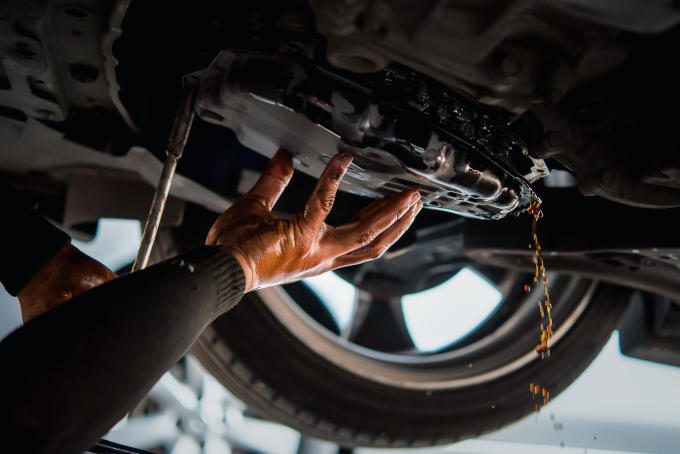Your car's transmission is the heart of your vehicle, converting power from the engine into usable energy. But when something goes wrong with this crucial component, it can leave you stranded on the side of the road, scratching your head and reaching for your wallet for costly transmission repairs.
The good news? With a little knowledge and some preventive care, you can keep your transmission in tip-top shape and avoid those dreaded breakdowns. Fixing transmissions isn't as scary as it sounds, so stick around as we walk through typical troubles and share a few simple ways to take care of your ride without breaking the bank.
The Vital Role of Transmission Fluid in Vehicle Performance
Transmission fluid is the lifeblood of your car's transmission system. It plays a crucial role in keeping your gears smooth and your vehicle running.
But here's the thing: not all transmission fluids are created equal. The type of fluid your car needs depends on whether you have an automatic or manual transmission, and transmission repair costs vary.
Automatic vs. Manual Transmission Fluid Needs
Automatic transmissions rely on a special type of fluid that acts as both a lubricant and a hydraulic fluid. This fluid helps cool and lubricate the moving parts while providing the necessary pressure to shift gears.
Manual transmissions, on the other hand, typically use a thicker, heavier oil that's designed to withstand the high temperatures and pressures generated by the gears and bearings. Some manual transmissions may even use a specialized gear oil that's formulated specifically for the demands of a manual gearbox.
Regardless of the type of transmission you have, one thing is clear: maintaining the correct fluid level and quality is essential for optimal performance and longevity. According to a study by the Automatic Transmission Rebuilders Association, regularly scheduled transmission maintenance can extend the life of your transmission by up to 50%.
Identifying and Addressing Transmission Fluid Leaks
One of the most common transmission problems is a fluid leak. A leak can lead to low fluid levels, which can cause several issues, from slipping gears to complete transmission failure.
Common Signs of a Leak
So, how can you tell if your transmission is leaking? Here are a few telltale signs:
- Puddles of reddish fluid under your car.
- A burning smell coming from your engine compartment.
- Difficulty shifting gears or slipping out of gear while driving.
If you notice any of these symptoms, it's important to have your vehicle inspected by a qualified mechanic as soon as possible. Ignoring a leak can lead to costly repairs down the road.
Professional vs. DIY Repair Options
When it comes to fixing a transmission fluid leak, you have two options: take your car to a professional mechanic or attempt a DIY repair.
We know it may be tempting to save money by tackling the repair yourself, but it's important to remember that transmission work can be complex and requires specific tools and knowledge. Unless you have experience working on transmissions, it's generally best to leave the job to the professionals.
According to a survey by Kelley Blue Book, the average cost of a transmission repair ranges from $1,800 to $3,400, depending on the severity of the problem and the make and model of your vehicle. While this may seem like a lot of money, it's a small price to pay compared to the cost of replacing your entire transmission.
Preventive Maintenance for Transmission Health
The best way to avoid costly transmission repairs is to practice preventive maintenance. If you take a proactive approach to your vehicle's health, you can catch potential problems early and lengthen the life of your transmission.
One of the most important things you can do is to check your transmission fluid level and condition regularly. Most vehicle manufacturers recommend checking the fluid every 30,000 to 60,000 miles, or as specified in your owner's manual.
If you notice that your fluid is low or has a burnt smell, it's time for a transmission service. This typically involves draining the old fluid, replacing the filter, and refilling the system with fresh fluid.
Other preventive maintenance tasks that can help keep your transmission in top shape include:
- Avoiding overloading your vehicle.
- Using the correct type of transmission fluid.
- Having your cooling system serviced regularly.
- Avoiding aggressive driving habits, such as rapid acceleration and hard braking.
The Consequences of Neglecting Transmission Fluid Maintenance
So, what happens if you neglect your transmission fluid? Over time, the fluid can become contaminated with metal shavings, dirt, and other debris, which can cause serious damage to your transmission.
If left unchecked, a dirty or low transmission fluid can lead to a host of problems, including:
- Slipping gears
- Delayed shifting
- Grinding or shaking sensations
- Complete transmission failure
In some cases, neglecting your transmission fluid can even cause your check engine light to come on, indicating a serious problem that requires immediate attention.
According to a report by the CarMD Vehicle Health Index, transmission issues are among the most expensive car repairs, with an average cost of $3,000 to $5,000. By taking care of your transmission fluid and practicing preventive maintenance, you can avoid costly repairs and keep your vehicle running smoothly for years.
Key Takeaway:
Transmission fluid is key to smooth gear shifts and vehicle health. Use the right type for your car, check levels regularly, and don't ignore leaks to avoid costly repairs.
Transmission repair may seem like a daunting task, but with the right knowledge and a little TLC, you can keep your car's heart beating strong for miles to come. Remember to listen for those warning signs, keep up with regular maintenance, and don't be afraid to call in the pros for transmission repair services when needed.
By taking care of your transmission, you're not just saving yourself from expensive repairs - you're ensuring a smoother, safer ride for you and your passengers. So go ahead, show your transmission some love, and enjoy the open road with confidence.

 Schedule Appointment
Schedule Appointment















